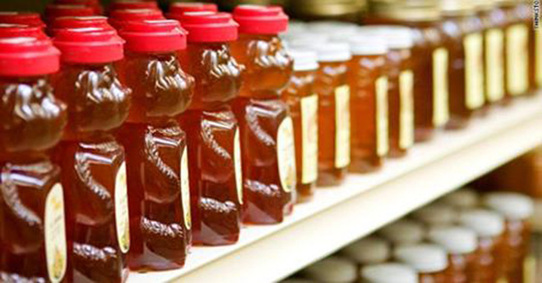
We all like honey. It is super-sweet, delicious and makes our tea taste better. Next time you spend some time in the honey aisle wondering whether you should buy a pricy premium, artisanal honey and store-brand nectar in a plastic bear, think twice before making a decision based on the price.
Food Safety News did a searing investigation and found that 76% of the honey sold in grocery stores is treated with “ultra-filtration,” a process that not only removes impurities like wax, but also pollen traces. Taking all brandsinto consideration, generic brands were the most likely to be ultra-filtered.
Ultra-filtration brings different issues. Many agree that pollen, and other “impurities,” are actually good for our health, making honey a much better choice than its rivals like sugar, for example.
This process does not bring many important benefits. On the contrary, it is expensive, does not improve the shelf-life, despite the fact that manufacturers say it does.
They say the ultra-filtration should be avoided mostly because the pollen is the only way to trace the source of the honey and its location. Ultra-filtered honey is often used to mask shady origins, especially Chinese honey, subjected to heavy import tariffs because of the contamination with heavy metals and illegal antibiotics.
Chinese ultra-filter honey, ship it through byzantine paths, and put their product on the shelves, without any tariffs, of course.
Honey samples were sent to Vaughn Bryant, a premier melissopalynologist and professor at Texas A&MUniversity. He found that three fourths of the honey had no pollen, meaning it was unidentifiable and unsafe. Here are some of his findings:
§ - 100% of Winnie the Pooh in Walmart stores had the pollen removed.
§ - 100% of the honey from individual packets from KFC and McDonald’s had also all the pollen removed.
§ - 77% of the honey from big box stores like Sam’s Club, Costco, and Target had no pollen.
§ - 100% of the honey from drugstores like Walgreen’s and CVS Pharmacy had all the pollen removed.
His testings showed that honey from co-ops, farmers markets and stores like Trader Joes had the full amount of original pollen.
Many have presented their concernes to the FDA, trying to stop adulterated and smuggled honey from standing on the grocery shelves, but with no success, as it seems.
The EU changed the labeling regulations, and required that honey containers had “pollen” added as an ingredient, even though some honey farmers objected, mostly those who call pollen intrinsic to their product.
One ounce of raw honey has 20 vitamins, 18 amino acids, 16 minerals and lots of antioxidants and phytonutrients. It has strong antibacterial, antiviral and antifungal properties, and is highly nutritious.
Raw honey is packed with significant amounts of B2, B3, B5, B6, C, magnesium, potassium, calcium, sodium chlorine, sulphur, and phosphate.
if you are worried about the quality of the honey you are buying, make sure you always buy honey from trusted markets and natural food stores. FSN also found that there are hardly any ultra-filtered honeys in these places.
 RSS Feed
RSS Feed
